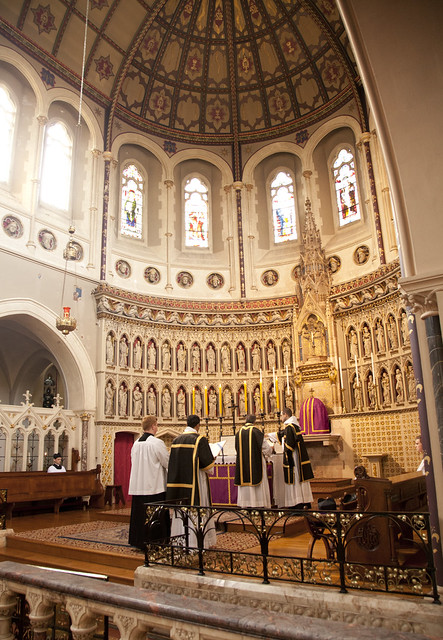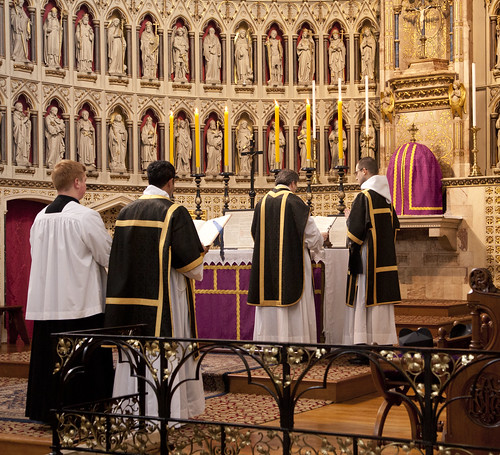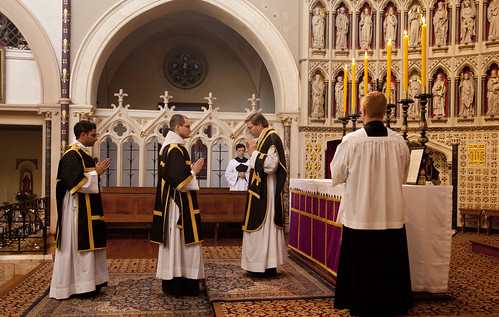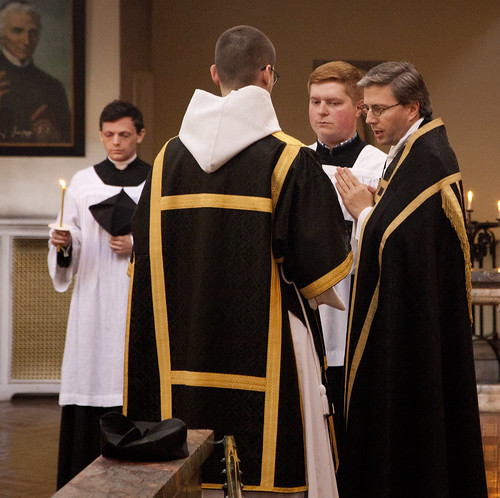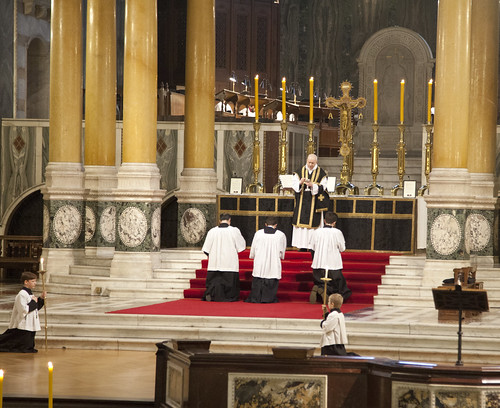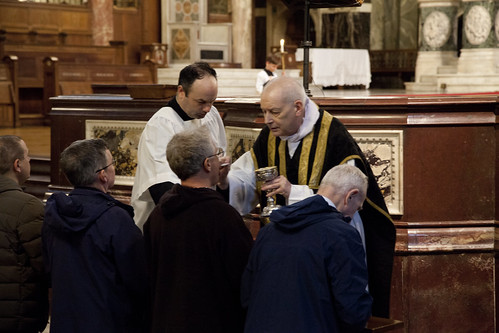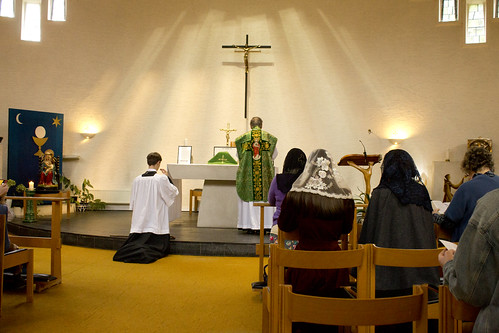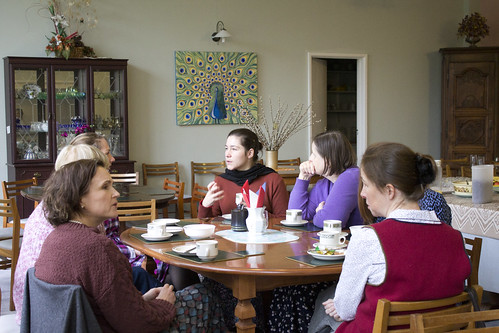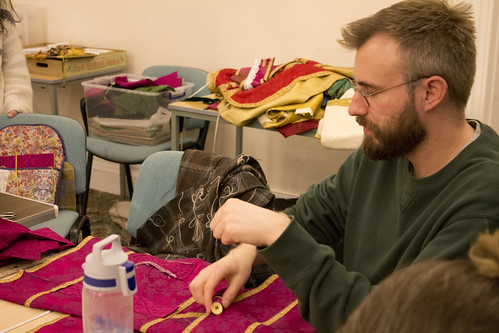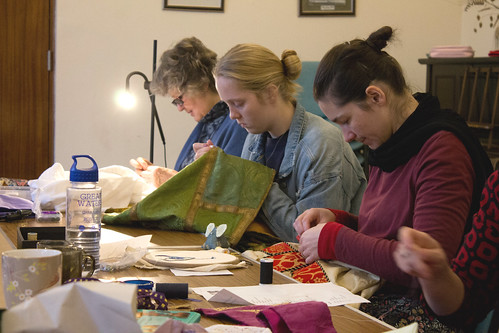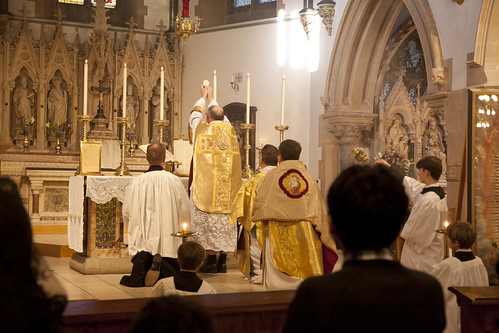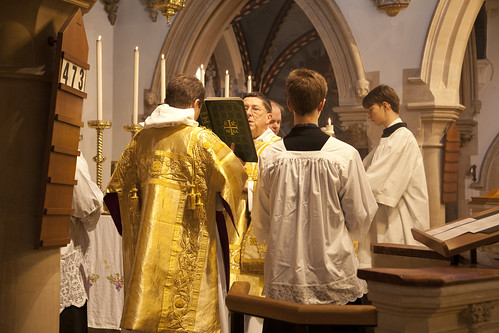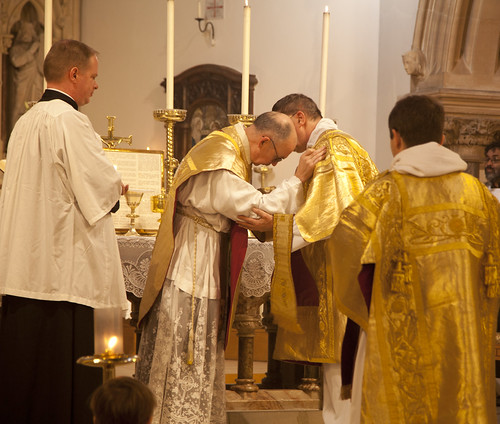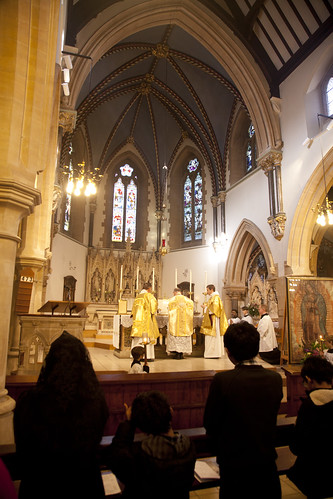Chairman's Blog
Annual St Benet's Hall Requiem
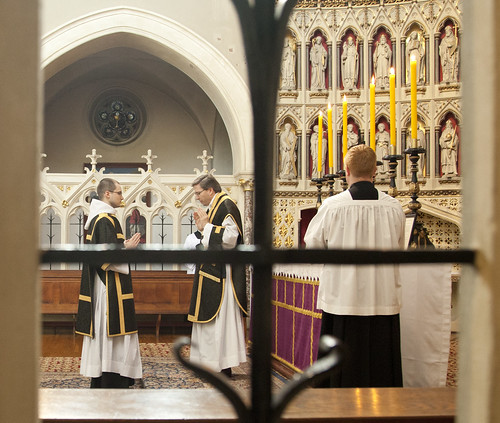
The first time I proposed such a Mass, to the last Master of the Hall who was a monk, Fr Felix Stevens, refused to allow it in the Hall chapel. However, I tried again with his successor, and it became an annual event.
The deacon was Dom Stanislaus Mycka of Farnbrough Abbey; the subdeacon was Br Joseph of the London Oratory. Mass was accompanied with chant by the Schola Abelis under Daniel Tate.
Support the Latin Mass Society
A Reply to Cavadini, Healy & Weinandy
| Rubrics erased in the Reform |
Cross-posted from Rorate Caeli.
Throughout this article they keep repeating two fundamental misunderstandings of the movement for the Traditional Mass, misunderstandings which make their analysis and recommendations beside the point. It is a principle of academic discussion that before criticising a position one must first be able to summarise it in a way which would be acceptable to those who put it forward. In this, CHW have, I am afraid, completely failed.
The first misunderstanding is in the motivation of the movement. It is all the more remarkable in that they express their own understanding as their reading of a passage from Peter Kwasniewski which says something entirely different. Dr Kwasnieski, as CHW quotes him, says this:
If at all possible, we should avoid participating in a form of prayer that deprives the Lord of the reverence that is due to Him. The Novus Ordo systematically does this by having removed hundreds of ways in which the Church showed her profound reverence for the Word of God and the holy mysteries of Christ.
CHW comment:
Such critiques presume that the reformed rite must be an occasion of significant irreverence; there is little appreciation of the many celebrations of the reformed liturgy with profound reverence, feeding the souls of countless members of the faithful in parishes throughout the world.
CHW want the argument to be about celebrants and perhaps the congregation lacking a spirit of reverence. But this is not what Dr Kwasnieski is talking about. He refers to the Novus Ordo’s reformers having “removed hundreds of ways in which the Church showed her profound reverence”. An obvious example would be the removal of the genuflection by the celebrant before each of the elevations. The reverence of the celebrant is another issue altogether.
Nor does Kwasnieski deny that people can be spiritually fed by the Novus Ordo. Like me and nearly all adult members of the Traditional Movement, he was fed by it himself for many years before discovering the Traditional Mass. What he felt, on making this discovery, is what he says in this passage: that there are things in the texts and rubrics of the Traditional Mass which express more clearly the reverence due to God than are to be found in the Novus Ordo.
I think this is extremely hard to deny, and perhaps that is why CHW don’t want to engage with this argument. Traditionalists could supply them with a mountain of examples, and also point to the published words of liturgists in no way committed to the Traditional Mass who have made similar arguments on particular points. Cardinal Ratzinger—as he then was—thought that the silent Canon was preferable, more reverent, more conducive to prayer, than the Canon proclaimed aloud. He and Cardinal Sarah have said the same thing about worship ad orientem being preferable to worship versus populum. Non-traditionalist liturgists have published critiques of the reformed Lectionary, the reformed Offertory Prayers, the Novus Ordo Sign of Peace, the reformed manner of receiving Holy Communion, and many other things. What is more, the Holy See itself has accepted some of these criticisms, such as those about the way the Collects were edited. In the 2008 edition of the reformed Missal a whole lot of words and phrases which had been cut out of them by the Concilium were actually restored.
Are CHW going to attack all these people for rejecting Vatican II? For failing to maintain communion with the Church? For lacking a proper respect for ecclesial authority? For failing to read the signs of the times? I very much doubt it. It is only when these arguments are made by Traditionalists that they are wrong. But this is ridiculous. There can’t be one law for us and another for everyone else.
The second misunderstanding is about how Traditional Catholics define themselves. CHW claim it is by reference to the Rite they attend: for Trads, they say, “‘Church’ is now defined by which Eucharistic rite one attends.”
This is easily disposed of. Among Traditional Catholics, there is absolutely no sense that the ancient Roman Rite is the only “true” or adequate or reverent liturgical form. If this seems surprising, consider the attitude of Traditional Catholics towards the ancient Dominican Rite, the ancient Ambrosian Rite, or the Eastern Rites.
I can imagine CHW protesting: Oh this is not what we meant! No, indeed: you didn’t think your statement through, did you? Trads are not fixated on the Roman Rite. The other rites are not so easy for most of us to attend, but we think they are great, and express in a beautiful way the universality and genuine pluralism of the Catholic Church. Typically trads regret the loss of liturgical diversity following the Council of Trent, and lament the ‘Latinisation’ of eastern Rites both before and after Vatican II; again, it is among Trads that you will find enthusiasts for the revival of the Sarum Rite and the regional Rites of France.
Given that CHW’s statement as written is totally false, what is the defining feature of Traditional Catholics? It is what it says on the tin: we are concerned with tradition: the passing on down the generations of a living patrimony of prayer, as opposed to the artificial manufacture of liturgy by committee: to paraphrase Cardinal Ratzinger.
This may make CHW a little uncomfortable, but it should be obvious that the rupture in this process of handing on, which Ratzinger referred to and which is undeniable by anyone with any knowledge of the matter coupled with intellectual honesty, is a problem. It is a problem, perhaps, with no easy solution. But it is right for Catholics to see it as a problem, because reverence for tradition is part of what it means to be Catholic.
Let CHW come out and deny that, if they can.
The attack on the Seal of Confession
The Report of the Independent Inquiry into Child Sexual Abuse (IICSA) published in October recommends ‘mandatory reporting’ of child sexual abuse, explicitly including under this requirement the breaking of the seal of the confession: that is, revealing things disclosed during the Sacrament of Penance, something considered so serious for Catholic priests that it leads to automatic excommunication. The Report’s recommendation follows similar moves in parts of Australia: the states of Victoria and Western Australia have passed laws seeking to oblige priests to disclose the content of confessions if these include allegations of child sexual abuse.
It is difficult to avoid the impression that the IICSA, like the Australian Royal Commission before it, and Australian state legislators, are more concerned with striking a pose than with the practicalities of child safeguarding. Their highlighting of the seal confession, implicated in precisely zero cases of child sexual abuse around the world, is reminiscent of their grandstanding demands, during their gathering of evidence, to see persons and documents from the Holy See, without bothering with official channels.
Pontifical Canon: reprint available from the Latin Mass Society
Cross-posted from Rorate Caeli.
This is a very handsome presentation of the main texts of the Mass, with illuminated capitals, full-colour picture pages, and large font, particularly for the Canon itself, which will be of particular benefit to readers with poor eyesight. These features are unfortunately not found with the 1962 edition of the Canon Pontificale.
The Canon Pontificale contains the prayers said at the Altar, from the Aufer a nobis (which follows the Preparatory Prayers) to the Last Gospel, but not the Proper Prayers and Lections. This makes it a slim volume of about 120 pages, intended for the use of Bishops.
It also contains the text of the Rite of Confirmation, the Blessing of a Chalice, and a few other things, such as prayers for use by the celebrant in preparation for Mass and in thanksgiving after it.
Mass of Ages Winter 2022 published
The Winter edition should be arriving with members right now: mine arrived today. It should also be in churches kind enough to stock it -- available free. It can be read online through the ISSUU website or app, optimised for use on mobile devices.
Details of the latest edition, and how to get a printed copy, here.
My favourite quote from the latest magazine is in Mary O'Regen's column, talking about devotion to the Holy Face. She quotes from the autobiography of Douglas Hyde, a communist who became a Catholic:
Hyde heard a Political Bureau member gripe that, “We get women into the Party…but within 12 months of our turning them into Marxists they are about as attractive as horses.” ... “The hatred which the Party kindles and uses is often quite shockingly apparent in eyes as hard as those of a Soho prostitute and lips as tight as those of a slumland money-lender.”
My favourite image is a very contrasting one: the charming carving showing St Anne surrounded by her daughters, with her grandsons playing below and their husbands in a row behind them. The is the subject of Caroline Farey's art history column this issue.
Our regular columnists:
• The Chairman’s Message: On why the Church must find a way of making peace with the Traditional Mass, which is to say, with her own heritage
• Family Matters: timely advice from James Preece on how when times are rough, we need to look out for each other
• Art and Devotion, Caroline Farey looks at a 15th century sculpture from South Germany
• Rome Report, Diane Montagna looks at some controversial appointments
• Architecture: Paul Waddington looks at the delightful church of St Edward the Confessor, Sutton Park in Surrey
• Mary O’Regan explains how to honour and love Our Lord’s Face is to have the gift of youthful beauty
• Wine: Sebastian Morello on the perfect accompaniment to treasured companionship
• World News: Paul Waddington reports on what’s happening around the globe
Support the Latin Mass Society
LMS Annual Requiem: photos
Sewing Retreat: photos
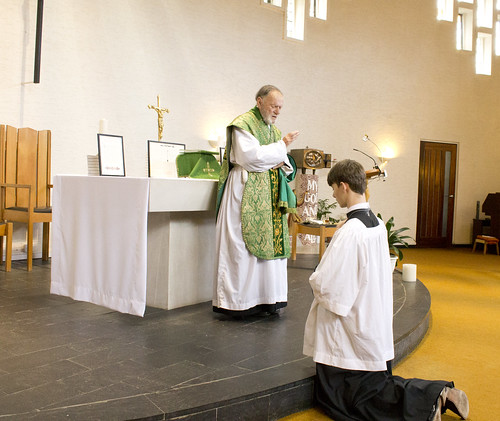 |
| Fr John Hunwicke celebrating Mass on the final day of the Retreat, wearing a set of vestments repaired by the Guild. |
The Retreat was as always fully booked, and a great success. This time a family came from Scotland, and a lady from New England.
The Retreat giver was Fr John Hunwicke of the Ordinariate. He celebrated Low Mass each day for the retreatants, and gave them a series of spiritual conferences. In between times they made and repaired vestments, many of them belonging to the Latin Mass Society.
 |
|
The Guild organises two such Retreats each year, in the spring and in the autumn. The next one will take place from 3rd to 5th February in the same venue, Park Place Pastoral Centre in Hampshire; the Retreat Giver will be Fr Thomas Crean OP. More details and booking here.
|
Pilgrimage to Bedford: Photos
The celebrant was Fr Gerald Byrne, deacon Fr Michael Cullinan, and the subdecaon Fr Gregory Pearson OP. It was accompanied by chant and polyphony.
It was a Votive Mass of Our Lady of Guadalupe, a feast proper to the United States of America. Under the rules of the 1962, a Mass formulary authorised for anywhere in the world can be celebrated as a Votive Mass. Most of the chants are specially composed for this Mass.
James Bogle on the Royal Prerogative
Cross-posted from Rorate Caeli. The idea that Catholics should bear a grudge against the late Queen Elizabeth II because she failed to veto the Abortion Act and other immoral legislation is based on the idea that she had the power to do this. James Bogle, in this article, shows that she did not. This seems to me to be of the greatest possible importance, and worth explaining with a bit of historical and legal detail.
 |
| 2008 photo by 'brokenkey' via Wikipedia commons. |
In the Octave of the Feast of Christ the King…
To the King of ages, immortal, invisible, the one only God, be honour and glory forever…
By James Bogle Esq
The article on the web-site of the British-based lay initiative, Voice of the Family, formed to defend Catholic teaching on the family, headed “To God alone be the honour and glory” by my good friend, Dr Alan Fimister, has all the good intentions that I have learned to associate with him.
However, it misrepresents the true position of the British monarch, not least our late Queen Elizabeth II, and that on a very serious and important issue.
I respond now to Alan’s piece in fraternal charity with the sole aim of arriving at the truth which, of course, should be the first concern of all Catholic journalists and writers. I am grateful to Rorate Caeli for publishing this article and saddened that Voice of the Family was unwilling to do so or to correct the highly misleading and damaging impression left by Alan’s article.
Unfairly disparaging the Monarch effectively encourages secular republicanism which is the only alternative available today and, moreover, can undermine relations between nationalist and monarchist, not least in sensitive communities like those in Northern Ireland where conflict has raged on that issue for many decades.
Moreover, it is in just that very Province that key moral issues such as abortion and the role of the family have been most hotly contested, with the government in Westminster imposing highly immoral legislation upon the Province, by ministerial fiat and against the will of the majority of the people living there.
The blame for this lies with the ministers and Parliament and not with the Monarch who has no power to prevent it.
Most of Alan’s article is typically eloquent, learned and reasonable but his criticism of our late Queen is wrong as a matter of constitutional law.
Let me start, however, with the title of his article which is also significant.
In adopting the old Scriptural motto, soli Deo gloria, Alan mistranslates the Latin in the very same way that the Protestant rebels of the 16th century did i.e. as “to God alone”.
Indeed, that mistranslation became one of the 5 solae summarising the fundamental beliefs of those same Protestant rebels i.e. (1) grace alone (2) faith alone (3) Christ alone (4) Scripture alone and (5) God alone – soli Deo gloria.
All these solae were understood in an heretical sense and so were condemned by the Magisterium of the Catholic Church.
The true sense of soli Deo gloria – “to the one only God” - is seen in its Biblical context. 1 Timothy 1.17 reads, in the Vulgate Latin approved by the Catholic Church, thus:
Regi autem saeculorum immortali invisibili soli Deohonor et gloria in saecula saeculorum amen
meaning
“Now to the king of ages, immortal, invisible, the one only God, be honour and glory for ever and ever. Amen.”
[emphasis added]
The difference in meaning is striking and vital because the Protestant rebels meant by the phrase that only God should be given honour and glory, not the Virgin Mary, not the saints, not popes, bishops, magistrates, kings or emperors.
It was central to their teaching that, as Luther taught, the baptised are not cleansed of their sin but are, instead, not much more than “dung heaps covered in snow”, all equally evil, and God, with His grace (the “snow”), merely cloaks their evil (the “dung”) as if to hide it.
Thus, by the lights of such Protestantism, St Francis is as evil as Stalin and St Teresa of Avila as evil as Pol Pot but Christ, through His crucifixion and grace, simply “hides” all their evil
[1]
.
Far from being “dung hills covered in snow”, man grows in glory as he accepts redemption and grace (not least through the Sacraments) and the more he does so, the more glorious he becomes, with our Lady, the most glorious of all redeemed creatures, and the other saints ranged below her.
The Protestant view that we are all “dung hills covered in snow”, rather than a hierarchy of the saints in future heavenly glory, ranged about God, His angels and His saints, was the beginning of modern egalitarianism which eschews all idea of hierarchy and considers all men absolutely equal (and, under Protestantism, equally bad).
It was also the beginning of that modern republicanism which eschews hierarchy and extols egalitarianism, since it regarded all true Protestants as already equally “saved” and thus already “saints”, even in this life here below.
Hence Calvin’s Genevan republic was called a “republic of saints” and, in England, the Puritans, after treacherously executing King Charles I, called their new republican assembly the “Parliament of Saints”
[2]
.
Some “saints” these, that had just murdered their own King!
Nevertheless, the Puritan republics were the first secularist republics endorsing the principle of separation of Church and State (from which Puritan principle the United States gets its constitutional idea of a “wall of separation between Church and State”, a principle that is now used to arrest harmless people praying outside abortion clinics).
The idea of a marriage of Church and State is a profoundly Catholic idea, being neither secularist, like most modern republics, nor theocratic, like many Islamic states, but a dyarchy as taught by Pope St Gelasius I the Great, in his letter to the Eastern Emperor, Anastasius I Dicoros, entitled Famuli Vestrae Pietatis (and sometimes shortened to Duo Sunt, meaning “there are two” i.e. two powers, spiritual and temporal, papal and imperial, by which the world is ruled, of which the higher is the spiritual or conscientious).
This dyarchical idea was abandoned by many of the Protestant rebels but not, by any means, all.
Thus, in England, King Henry VIII, who still considered himself a Catholic even after he had repudiated the Holy See, retained a form of dyarchical government but making the temporal ultimately superior to the spiritual.
This dyarchical marriage of Church and State is still the basis of our British Constitution and part of what makes us, at least nominally, a Christian constitutional monarchy, even if the State Church is Anglican and not Catholic.
However, the progress of the Protestant revolt in Britain later proceeded along very different and very unstable lines leading ultimately to civil war.
It ended with the illegal execution and murder of King Charles I and the establishment of a unitary republic over England, Scotland, Ireland and Wales, of which Oliver Cromwell would eventually become dictator as “Lord Protector”.
The Monarchy was restored in 1660 with King Charles II who was, in turn, succeeded by his younger brother, King James II of England and Ireland and VII of Scotland, who had converted to Catholicism.
Anti-Catholics, Puritans and republicans, and those who had been revolutionaries against King Charles I, got up a petition to exclude the Catholic King James from the throne. They were called “Petitioners” or “Exclusionists” and were later called “Whigs”.
Those who abhorred the idea of Parliament seeking to exclude the rightful King from his rightful throne were called “Abhorrers” and were later called “Tories”.
Form these origins came the two main parties in the UK, the Liberal Party (“Whig”) and the Conservative Party (“Tory”).
King James, whilst remaining Catholic, was also Supreme Governor of the Church of England and, as King of Scots, royal protector of the Kirk, the Presbyterian Church of Scotland.
In 1687 and 1688, he issued a Declaration of Indulgence granting religious liberty to all his subjects of any mainstream religion, including the heavily persecuted Catholics, and even, technically, Jews and Muslims.
Seven bishops, in a petition, refused to read the Declaration of Indulgence from the pulpit (the media of the day) and so the King charged them with seditious libel. However, the King lost the case
[3]
and the seven bishops were acquitted.
The King was then betrayed by a conspiracy of civil and military officers, and Anglican bishops, who feared that such a widespread grant of religious liberty would weaken the Church of England (and the Church of Scotland) which might, in turn, weaken their own privileged positions and wealth.
Some even feared, irrationally, that King James might demand that they return the stolen and looted monastery lands that their Protestant ancestors had seized. This was irrational because King James had already promised not to do so because it was, by now, too late to do so effectively.
These conspirators supported a foreign invasion from the Dutch Calvinist republic under the Stadtholder, Prince William of Orange, who invaded England on 5 November 1688 landing at Torbay, Devon. A treacherous part of King James’ army deserted their posts on Salisbury Plain and went over to William of Orange which turned the tide in his favour.
King James was forced to flee, having been deserted by treacherous turncoat officers like John Churchill, made, by William of Orange, 1st Earl, and later, by Queen Anne, 1st Duke, of Marlborough.
William of Orange then became King William III of England, Scotland and Ireland. Savage penal laws against Catholics and “dissenters” were again restored by law and the Declaration of Indulgencewas abolished.
This event is known to history as the so-called “Glorious Revolution” of 1688, and with it the Constitutions of England, Scotland and Ireland changed dramatically. It effectively made Parliament, instead of the King, sovereign. This was encapsulated in the so-called “Bill of Rights” of 1688 (which, despite being called a “Bill” is, in fact, an Act of Parliament).
Thereafter, the circumstances in which the King could act alone, using the Royal Prerogative
[4]
, became severely limited.
Ironically, five of the seven acquitted bishops were subsequently removed, by Parliament, from office for refusing to swear allegiance to the new King William III. They considered him an usurper and not the true king and so refused to swear.
Instead, they formed a schismatic “non-juring” Anglican Church which later became the inspiration of the “High Church” and Oxford Movements, the latter famously producing Cardinal St John Henry Newman. The non-jurors enjoyed good relations with the Episcopal Church of Scotland (which had been ousted by the Presbyterians in 1637) and are also the spiritual ancestors of the worldwide Anglican-Catholic Ordinariate
[5]
.
After the Bill of Rights 1688, what was left of the Royal Prerogative, now very severely curtailed, began to be whittled down more and more over the succeeding decades and centuries.
From once having the power to prorogue Parliament whenever he did not need its advice (Parliament then being considered a body that advised the King, not one that dictated to him) the Monarch could now barely even refuse a Bill presented to him for Royal Assent.
Today, the most important Prerogative powers are exercised exclusively by ministers and include the power to make war and deploy the armed forces, to conduct foreign policy and make treaties, to make public and judicial appointments, to issue passports, and to grant pardons and honours, among others.
The Monarch still exercises some Prerogative powers himself, known as “the Reserve Powers” or “the personal Prerogatives”, but only on the advice of ministers. The most important of these are the power to appoint and dismiss ministers, including the Prime Minister, to summon and prorogue parliament, and to give the Royal Assent to Bills passed by Parliament.
However, all of these powers can onlybe exercised solely on the advice of ministers and not at the discretion of the Monarch acting alone.
If there is concern that ministers have improperly “advised” the use of Prerogative powers, then the “advice” upon which these powers were exercised can be reviewed by the courts
[6]
and thus, in effect, so can the exercise of those powers. Otherwise, these powers are unimpeachable by the courts.
Parliament itself can also over-rule certain Prerogative powers by enacting a statute.
For example, the power to appoint and regulate civil servants was placed on a statutory footing by the Constitutional Reform and Governance Act 2010 which also codified the constitutional convention that new treaties have to be laid before Parliament before the government can ratify them.
The very last time that a Monarch, acting alone on her own discretion, refused Royal Assent to a Bill was in 1708 when Queen Anne, the last of the Royal Stuarts (allowed by Parliament to accede to the throne because she was a Protestant), refused assent to the Scottish Militia Bill.
Since then, the British Constitution has so far developed that, today, the Monarch may not now refuse assent to any Bill at all unless advised so to do by his ministers.
Indeed, the procedure today for giving Royal Assent usually involves Lords Commissioners, nominally appointed by the Monarch “on advice” of ministers (and thus actually appointed by the Prime Minister). They call upon the clerk of the House of Lords to signify the Royal Assent with the words “Le Roi le veult”, meaning, in Law French, “the King wishes it” and the clerk duly speaks those words openly in the House. However, the Monarch has, in reality, almost nothing to do with it.
However, the common view of constitutional lawyers is that there is one exception to the general rule that the Monarchy cannot, on his own discretion, veto a Bill passed by Parliament and it is this: the Monarch may refuse Royal Assent and so veto a Bill, against the advice of ministers, if it is a Bill that attempts permanently to destroy democracy e.g. by extending the life of Parliament indefinitely or by gerrymandering the electorate so that the government can never be removed.
This is the one time the Monarch may refuse Royal Assent, and so veto a Bill, acting on his own discretion and against the advice of ministers. The Monarch is permitted so to do because obviously ministers are not going to advise vetoing their own Bill attempting to abolish democracy.
This is the one and only rare exception where the Monarch may veto a Bill on his own discretion
[7]
.
For similar reasons, the Monarch also has power, acting alone on his own discretion, to dismiss a Prime Minister who refuses to resign after losing the confidence of the House of Commons.
In all other respects, however, the Monarch has no more power to veto a Bill passed by Parliament than do you or me.
If the Monarch were to attempt to seize such a veto power, he would be subverting and destroying the very Constitution that he had sworn to uphold and protect. It would, in effect, be a coup d’etat by the King against the State and thus a form of immoral and illegal sedition which St Thomas Aquinas condemns as seriously sinful
[8]
.
If the present King were to try to do so then he, Charles Mountbatten-Windsor, would, in his private and personal capacity, be raising a rebellion against both Parliament and the Crown i.e. against King Charles III in his official capacity. It would be hard to imagine a more seriously illegal and immoral sedition than that.
St Thomas also teaches us that “accordingly the sin of sedition is first and chiefly in its authors, who sin most grievously”
[9]
. The Church teaches the same
[10]
.
It is also the teaching of the Catholic Church that the ends do not justify the means and that we may not do evil that good may come of it.
Alan, himself, says so in his Voice of the Family article: “so must we never do evil that good may come of it.”
This is also expressly taught by St Paul in Romans 3.8
[11]
.
Therefore, the Monarch may not raise a sedition or a coup d’etat in order to veto a Bill that he has no power to veto, no matter how bad that Bill may be. That would be “to do evil that good may come of it”, the very thing that Alan agrees we, as Christians, may never do.
Yet Alan condemns our late Queen for not doing so – for not doing evil that good may come of it.
He complains of “her complicity in the various immoral Acts of Parliament which disfigured her reign” failing to understand that she had no such “complicity” whatsoever because she had no such power.
As a matter of constitutional law, Alan is simply wrong.
He has failed to understand that, under the British Constitution, it is Parliament that is sovereign, not the Monarch.
To accuse our late Queen of sinning by refusing to veto the Abortion Bill (or any other immoral Bills) one must first prove that she had such a power.
However, as a matter of law, no such power belonged to her.
One simply cannot blame a person for failing to exercise a power that the person does not possess.
The blame for these immoral Bills must lie where it belongs: with those who did have power to pass them, namely the ministers and Parliament.
To blame the Queen for them is a sin against charity, justice and filial piety.
It is like the bad policeman who, unable to catch the real criminal, arrests innocent people, instead, and locks them up out of anger at not finding the true criminal.
It is like the bad soldier who, unable to defeat the enemy and take a certain defended locality, takes out his anger on innocent local civilians by attacking them instead.
The British Monarch is “sovereign” in name only. The true sovereign is Parliament. That is the meaning of the principle of parliamentary sovereignty.
Accordingly, the rest of Alan’s criticism of our late Queen falls away.
Our late Queen cannot be blamed or condemned for failing to use a power that she did not have. Still less may she be blamed for failing to destroy the Constitution and, in defiance of St Paul and Christian morality, failing to do evil that good may come of it.
Alan has erred and erred grievously. He must make amends.
He has sought to tarnish and defame the reputation of our late Queen most unjustly.
In so doing he has helped to undermine our Constitutional monarchy not only here in Britain but across the whole Commonwealth. He has also aided and abetted the only alternative to Christian constitutional monarchy, namely secular republicanism, and thereby aided that very same secularism which Voice of the Family claims to be defending us from.
In so doing, he has inadvertently given aid, comfort and support to the secular republicanism that is destroying Christianity world-wide and which, taking Ireland as an example, so frequently succeeds in secularising even once strongly Catholic countries.
Is that what a Catholic scholar and journalist should be doing? No, of course not.
Our late Queen was truly a model of unblemished character, virtue, selflessness and of Christian leadership, witness and dignity, albeit as a Protestant. We were extremely fortunate to have her as our Head of State and for so many years. Very few heads of state can be compared to her.
Thos who wish to challenge or criticise our late Queen should first of all find out the true facts and not proceed from a position of unlearned error.
Let us Catholics, then, not cheapen ourselves by carelessly and wrongly lashing out at her, and her 70 years of unimpeachable good conduct and good witness, by seeking to blame her for evils that she had no part in.
**Ends**
JAMES BOGLE is a barrister (trial lawyer) of the Middle Temple, London, author, historian and former army officer.
[1]
As Luther put it pecca forte, crede fortiter – “sin strongly, but believe more strongly still” for it is the original Lutheran Protestant belief that the Elect go to heaven merely by believing in Christ, no matter how much they may sin in their daily lives.
[2] This “Parliament of Saints” was preceded by the “Rump” Parliament which consisted of those Members left after the Long Parliament was “purged”, on 6 December 1648, by Colonel Thomas Pride, in “Pride’s purge”, throwing out all Members, many of them Presbyterians, who wanted the return of King Charles I or who were opposed to the execution of the King. This was done on the orders of Commissary General Thomas Ireton whose title and position have resonances with those of a Soviet commissar. Between 6 and 12 December 1648, Colonel Pride, supported by 2 regiments, prevented 231 Members from entering the House of Commons and imprisoned 45 of them, so that the Army controlled the House entirely. The remaining Members, almost all extreme radicals, formed the “Rump” Parliament and voted to set up a bogus High Court to try the King which the House of Lords then rejected. Nevertheless, it was illegally set up. The King, upon being brought before it, accordingly challenged its jurisdiction. However, that illegal “court” then signed the King’s death warrant and the King’s execution proceeded soon after on 30 January 1649. Thereafter, the “Rump” Parliament voted to abolish both the House of Lords and the Monarchy and established a Council of State to rule the new republic of Britain. Soon enough, Cromwell came to regard the “Rump” Parliament as corrupt and, on 20 April 1653, famously harangued them and said, in a speech no King would ever have dared to make, “depart, I say; and let us have done with you. In the name of God, go!”. He then declared "you are no Parliament" and called in a troop of soldiers, under the command of Major-General Thomas Harrison, ordering them to clear the chamber. Turning to the Speaker’s Mace, the symbol of parliamentary power, he declared it a “fool’s bauble” and ordered it taken away. Within a month he had set up a “Nominated Assembly” called “the Parliament of Saints”. The absurdly named Puritan, Praise-God Barebone, leather seller, preacher and member of the heretical millennialist sect, the Fifth Monarchy Men, gave his name to this “Parliament of Saints”, it being also called Barebone’s Parliament. From the start its Members became a subject of ridicule, many commentators calling them "pettifoggers, innkeepers, millwrights, stocking-mongers and such a rabble as never had hopes to be of a Grand Jury". In particular, its members were singled out for their low social status, their Puritanism and their relative lack of political experience, all exemplified by Mr Barebone himself. This “Parliament of Saints” came into being on 4 July 1653 and was the last attempt at political stability by the republic before the dictatorship called “the Protectorate”. Cromwell and the Army Council nominated all its members (129 from England, 5 from Scotland and 6 from Ireland, the latter all English army officers) so that it has appeared to posterity as a kind of proto-Fascist republican parliament. It dissolved itself, after much in-fighting, on 12 December 1653, and Cromwell, as “Lord Protector”, then became dictator of the republic, a fate so often reserved for egalitarian, secularist republics throughout history.
[3]
Dominus Rex versus Archiepiscopum Cantuariensem et al. De Termino Sanctae Trinitatis Anno Regni Jacobi Secundi Regis, Quarto, In Banco Regis. Die Veneris Decimo Quinto Die Junii, 1688 (The King v the Archbishop of Canterbury and others, in Trinity Term in the fourth year of the reign of King James II, in the Court of Kings Bench, on Friday 15 June 1688).
[4]
The Royal Prerogative is so called because it refers to the right of the King to speak (i.e. legislate or command) before (and after) all others, including Parliament. It comes from the Latin words rogare, to speak, and pre, meaning “before” i.e. prerogare “to speak before” all others.
[5]
All of these non-jurors remained, unsurprisingly, the strongest supporters of the Catholic Stuart dynasty and of the Catholic Prince Charles Edward Stuart, “Bonnie Prince Charlie”, particularly during the Jacobite uprisings to restore the legitimate Stuart dynasty to the thrones of England, Scotland and Ireland.
[6]
A recent example of this was the 2019 prorogation ruling in which the Supreme Court decided that Mr Boris Johnson’s advice to the Queen to prorogue parliament for five weeks was unlawful – see R (Miller) v the Prime Minister and Cherry v Advocate General for Scotland [2019] UKSC 41.
[7]
Erskine May, Thomas, A Treatise upon the Law, Privileges, Proceedings and Usage of Parliament, 1st Ed, 1844, chs 1 & 2, 25th Ed, 2019, ch. 1; Bagehot, Walter, The English Constitution, 1867, London: Chapman and Hall, ch. II; Dicey, A V , Introduction to the Study of the Law of the Constitution, 1885, London: MacMillan, Parts I & III; Bogdanor, V, The Monarchy and the Constitution, 1997, Oxford: Oxford University Press; Hood Phillips, O and Jackson, Constitutional and Administrative Law, 8th edn, 2001, London: Sweet and Maxwell, at para.7–010 & p.136; Tomkins, A, Public Law , 2003, Oxford: Oxford University Press, at pp.63–64; Bogdanor, V, The New British Constitution, 2009, Oxford: Hart Publishing; Barnett, H, Constitutional and Administrative Law, 10th edn, 2013, London: Routledge, at p.325; Halsbury’s Laws of England, Vol.20 (Constitutional and Administrative Law), 2014, London: LexisNexis, at para.18; Parpworth, N, Constitutional and Administrative Law, 8th edn, 2014, Oxford: Oxford University Press, at para.4.9; Bradley, Ewing and Knight, Constitutional and Administrative Law, 16th edn, 2015, Harlow: Pearson Education, at pp.19 and 207; Zander, M, The Law-Making Process, 7th edn, 2015, Oxford: Hart Publishing, at p.49; Wheeler, G J, Royal Assent in the British Constitution, LQR 2016, 132(Jul), 495-505. The exercise of the Royal Assent is not purely formulaic in the sense that the Crown, acting on the advice of ministers, might, in very rare circumstances (e.g. a minority government, or a colonial or devolved government), theoretically be advised to withhold assent but such a situation is highly unlikely. What we are considering here is not such a scenario but rather the Crown refusing assent against the advice of ministers or acting alone. That, it is agreed by the relevant constitutional authorities, would only be lawful in the situation where the whole Constitution were about to be vitiated e.g. by extending the life of Parliament indefinitely or gerrymandering the electorate so that the government could never be ousted – that is to say, permanently destroying democracy. Otherwise, the Monarch, acting alone, no more has such veto power than do any of his subjects.
[8]
St Thomas Aquinas, Summa Theologiae, II-II, Q.42.
[9]
Ibid., Q.42, A.2.
[10]
Catechism of the Catholic Church, paras. 2238-2240.
[11]
“And not rather (as we are slandered, and as some affirm that we say) ‘let us do evil, that there may come good?’ whose damnation is just” Rom 3.8.
Memento mori: for Catholic Answers
Yesterday began the Church’s month of the dead. We remember those who have died, and this should stimulate us to keep our own deaths in mind. Today, on All Souls’ Day, I wish to focus on the latter activity: the remembrance of death, associated with the artistic theme of the memento mori, a visual reminder of death.
Memento mori literally means “remember” (a command) “to die” (an infinitive)—that is, “remember that you, the onlooker, will die.” It is a pithy restatement of the words of the priest who places ashes on the foreheads of the people on Ash Wednesday: “Memento homo quia pulvis est et pulverem reverteris.” (“Remember, man, that you are dust, and to dust you shall return.”)

